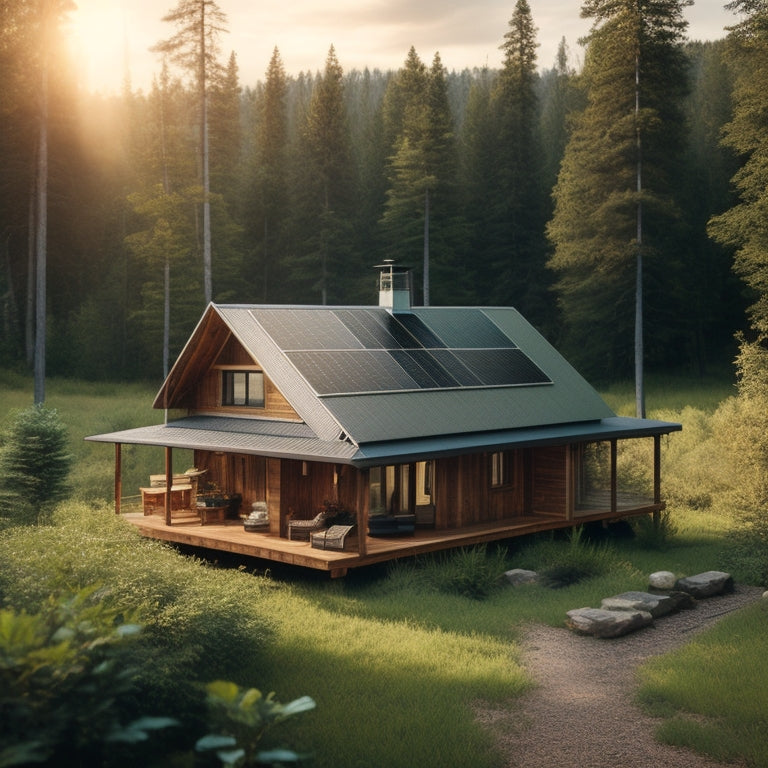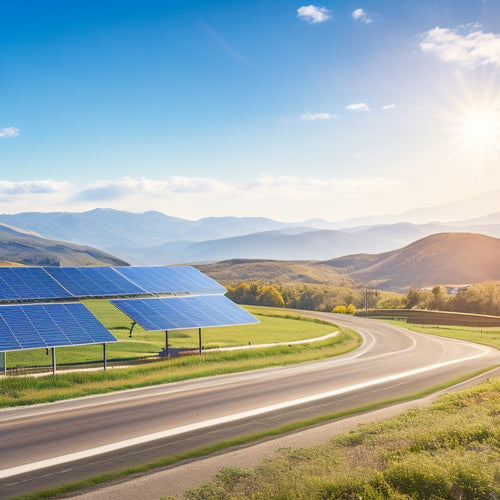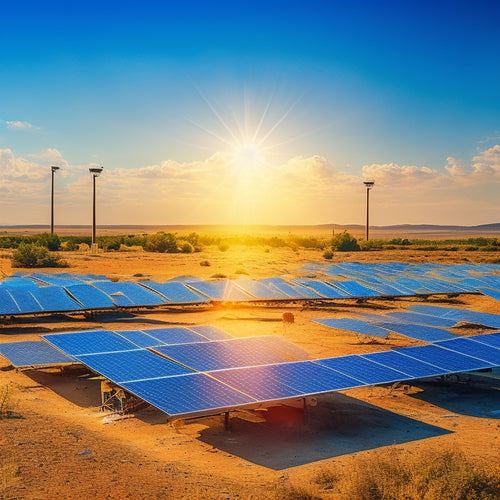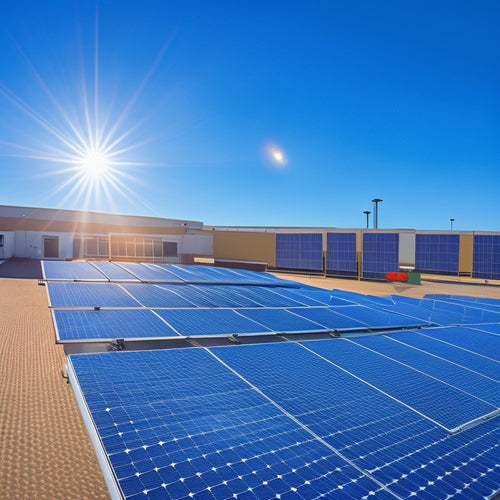
Solar Panels for Off Grid Living
Share
By incorporating solar panels into your off-grid living setup, you're taking a significant step towards achieving energy independence, reducing your reliance on traditional power grids, and revealing a cleaner, more sustainable future. You'll be able to power your daily activities, from morning routines to evening routines, using natural light as a clean energy source. With the right system size and energy storage, you can eliminate monthly utility bills and enjoy the benefits of renewable energy. As you investigate the world of off-grid living, you'll realize the importance of optimizing energy harvesting, evaluating energy demands, and maximizing power efficiency to create a seamless and sustainable lifestyle.
The Essentials
- Off-grid solar panels enable energy independence, reducing reliance on traditional power grids and utility companies.
- Properly sized solar panel systems can eliminate monthly utility bills, providing zero-cost electricity.
- Assessing energy usage patterns and power needs is crucial to determine the required solar panel system size and energy storage capacity.
- Maximizing solar panel power output and energy conversion rates is critical for reliable off-grid living, achieved through optimal panel placement and high-quality batteries.
- Energy-efficient upgrades and adaptive energy usage strategies are necessary to optimize energy consumption and ensure a sustainable off-grid lifestyle.
Energy Independence at Dawn
You're likely no stranger to the benefits of renewable energy, and you're taking the first steps towards energy independence.
As you start your day, you're powering your morning routines with clean energy from your solar panels.
By adopting mobile solar solutions, you're free from limited energy access and noisy generators, allowing you to venture further off the grid.
With the rise of renewable energy, you're part of a growing movement that's reducing reliance on traditional power grids.
Rise of Renewable Energy
As the world witnesses a seismic shift away from fossil fuels, renewable energy sources are emerging as the guiding light of hope for a sustainable future.
You're likely aware that our reliance on finite resources has taken a devastating toll on the environment. However, the rapid development of renewable technologies is clearing the path for a cleaner, greener tomorrow.
Sustainable practices are becoming the norm, with green innovations driving eco-friendly solutions that reduce our carbon footprint.
With off-grid electrical systems, you'll no longer be at the mercy of utility companies, worrying about spiked electricity bills, or dealing with the uncertainty of power outages caused by severe weather or infrastructure malfunctions energy independence.
As you consider off-grid living, you're likely drawn to alternative resources that offer energy independence.
Solar advancements have made it possible to utilize the power of the sun, providing a reliable source of energy that's free from the grid.
The climate benefits are undeniable, with a significant reduction in greenhouse gas emissions.
The energy transformation is underway, and it's crucial to understand the environmental impact of our choices.
Powering Morning Routines
How do your morning routines currently rely on traditional energy sources? From flipping on the lights to brewing your morning coffee, you likely rely on the grid to get your day started.
But what if you could utilize the power of natural light to fuel your morning routine instead?
With solar panels, you can generate your own energy and break free from reliance on traditional sources. Imagine waking up to the warmth of natural light, powering your coffee maker, and illuminating your morning routine without a single watt from the grid.
Solar panels can make this a reality, providing a clean and sustainable source of energy to power your morning essentials.
Zero Energy Bills Guaranteed
You're about to experience the thrill of Energy Independence Now, where your solar panels generate enough electricity to power your off-grid lifestyle.
By investing in renewable energy solutions, you'll not only reduce your carbon footprint but also increase energy efficiency.
With a properly sized and installed system, you'll enjoy Zero Cost Electricity, freeing you from the burden of monthly utility bills.
Energy Independence Now
Achieving energy independence is a liberating experience, and with the right solar panel system, it's crucial to now within your grasp. You'll no longer be tied to the grid, and you'll have the freedom to live life on your own terms.
With solar storage and backup systems, you'll have a reliable source of energy, even during power outages or extended periods of low sunlight.
Embracing energy conservation and a sustainable lifestyle is key to maximizing your off-grid experience. By investing in renewable energy solutions, you'll not only reduce your carbon footprint but also enjoy significant savings on your energy bills.
With solar incentives and grid alternatives, making the switch to off-grid technology has never been more attractive.
As you consider your options, it's crucial to think about battery solutions that can store excess energy generated by your solar panels.
Energy monitoring systems will help you track your energy usage and optimize your system's performance.
Zero Cost Electricity
By integrating a solar panel system with energy storage and backup solutions, you've taken a considerable step towards energy independence.
With a well-designed system, you can kiss those pesky energy bills goodbye. Zero cost electricity is now a reality, and you're one step closer to achieving sustainable living.
The key to achieving zero energy bills is to confirm your solar panel system generates enough electricity to power your home throughout the day.
Any excess energy is stored in your battery storage system, which can be used during the night or on cloudy days.
With solar incentives, the cost of installing a solar panel system has decreased markedly, making it more accessible to homeowners.
Maximum Power Point Tracking
When you're living off the grid, you want to squeeze every last watt out of your solar panels. With a reliable off-grid energy solution, you can eliminate reliance on public utilities and reduce electricity bills.
Renewable energy systems like MPPT can guarantee efficient power conversion. Maximum power point tracking (MPPT) helps you do just that by optimizing energy harvesting and guaranteeing efficient power conversion.
Optimizing Energy Harvesting
Your solar panel system's ability to generate power depends on its capacity to optimize energy harvesting. To achieve this, you need to focus on solar panel placement, ensuring they receive maximum sunlight throughout the day.
Additionally, battery storage optimization is essential to store excess energy generated during peak hours for later use. Energy efficiency upgrades, such as LED lighting and energy-efficient appliances, also play a significant role in reducing energy consumption.
Seasonal energy variation is another factor to take into account. During summer, your solar panels may generate more power than needed, while in winter, they may not produce enough.
To mitigate this, you can adjust your energy usage habits or invest in energy storage solutions. Solar technology advancements have made it possible to generate more power from the same surface area, making it easier to optimize energy harvesting.
Efficient Power Conversion
Efficiency is the name of the game in off-grid living, and efficient power conversion is vital to getting the most out of your solar panel system. You want to guarantee that the energy harvested from your panels is converted into usable power with minimal losses.
This is where Maximum Power Point Tracking (MPPT) comes in - an essential component of efficient power conversion. MPPT technology allows your system to optimize energy production by identifying the maximum power point of your solar panels and adjusting the voltage and current accordingly.
When selecting an inverter, look for one with advanced MPPT capabilities to maximize solar efficiency. This is especially important in off-grid systems where energy storage is limited.
By optimizing power conversion, you'll get the most out of your solar panels and reduce the strain on your energy storage system. With advancements in photovoltaic technology and inverter selection, you can enjoy reliable and efficient power management in your off-grid system.
Assess Your Energy Demands
You need to understand your energy usage patterns to determine how much power you require from your off-grid solar panel system.
Implementing off-grid renewable energy sources can provide numerous advantages and cost savings, including reducing your reliance on traditional power grids alternative power solutions.
To do this, calculate your daily power requirements by identifying the appliances you'll be using and their corresponding energy consumption.
Energy Usage Patterns
Most off-grid households consume a significant amount of energy during morning and evening hours, with peak usage typically occurring between 7-10 am and 4-8 pm.
This pattern is essential to understand, as it directly impacts your energy consumption and, consequently, your solar panel requirements. By recognizing your energy habits, you'll be able to make lifestyle adjustments that promote usage efficiency and reduce your overall energy demands.
You'll need to reflect on how you can balance your energy loads, optimizing your power management to guarantee a smooth integration with your renewable energy system.
This might involve shifting non-essential tasks to off-peak hours or investing in energy-efficient appliances.
Battery storage will also play a vital role in managing your energy supply, particularly during seasonal variations when energy production may be lower.
Daily Power Requirements
How much power does your off-grid lifestyle require on a daily basis? To determine your daily power requirements, you'll need to calculate your total daily energy consumption in watt-hours (Wh). This involves identifying your essential appliances, their power ratings, and the number of hours they're used daily.
Start by listing your must-haves, such as lights, fridge, computer, and water pump. Next, research their power consumption in watts (W) and calculate their daily energy usage in Wh. For instance, a 10W LED light used for 8 hours a day consumes 80Wh.
Add up the daily energy usage of all your appliances to get your total daily power requirement. This will help you determine the size of your solar energy system and power storage capacity needed to support your off-grid lifestyle.
A accurate assessment of your energy demands guarantees you can enjoy the freedom of off-grid living without worrying about running out of power.
Higher Energy Conversion Rate
When selecting solar panels for off-grid living, you're looking to maximize power output.
A higher energy conversion rate is essential, as it directly impacts the amount of electricity your system can generate.
Maximizing Power Output
Enhancing your solar panel system's energy conversion rate is essential to maximizing power output for off-grid living. You want to verify you're getting the most out of your system, and that means optimizing every aspect.
Start by evaluating your solar panel placement. Ideally, your panels should face directly at the sun, with minimal shading or obstruction. This will guarantee maximum energy absorption.
Next, consider your energy storage solutions. Invest in high-quality batteries that can efficiently store excess energy generated during the day for use at night or during periods of low sunlight.
You should also consider upgrading to a more efficient inverter, which can help convert DC power to AC power with minimal loss.
Additionally, regular maintenance is vital to prevent energy losses due to dirt, dust, or other issues.
Frequently Asked Questions
Can I Install Solar Panels on a Metal Roof?
You can install solar panels on a metal roof, but consider the installation's compatibility with your roof's material, gauge, and fastening system to guarantee a secure and watertight seal, and consult a professional if you're unsure.
How Long Do Solar Panels Last in Harsh Weather?
You'll be relieved to know that solar panels are built to withstand harsh weather conditions, boasting impressive durability with a typical lifespan of 25-30 years, even in extreme weather, with high-quality panels performing at their best.
Can I Expand My Solar Panel System Later?
As you gaze out at your current setup, you're wondering if you can upgrade later. Yes, you can expand your system, but it's essential to take into account system sizing and energy efficiency from the start to guarantee a seamless addition of new panels.
Are Solar Panels Suitable for Small Cabins?
You'll find solar panels suitable for small cabins if you consider the cabin's energy needs and optimize solar panel efficiency by choosing the right system size, panel type, and mounting configuration to meet your off-grid power requirements.
Do Solar Panels Work During Power Outages?
Ha! You think the grid's gonna save you? Nope, it's gonna fail, and you'll be stuck in the dark... unless you've got a solar panel setup, that is. Then, you'll be the one laughing, since they'll keep on generating power during outages, no problem!
Final Thoughts
As you commence your off-grid expedition, solar panels become the guiding light of energy independence, illuminating your path to zero energy bills. With maximum power point tracking, you'll capture the sun's energy like a pro. Assess your energy demands, and let the higher energy conversion rate work its magic. Now, you're the ruler of your own energy destiny, basking in the radiance of self-sufficiency. Like a rising phoenix, your off-grid dream takes flight, unshackled from the grid's constraints.
Related Posts
-

Is Switching to Green Energy Solutions Easy
Switching to green energy solutions isn't just easy; it's also beneficial. You can greatly cut utility costs and enjo...
-

What Happens Without a Charge Controller in Solar Panels
Without a charge controller in your solar panel system, you risk overheating batteries due to overcharging, which can...
-

Essential Solar Panel Mounts for Commercial Properties
When it comes to essential solar panel mounts for your commercial property, durability and wind resistance are key fa...


